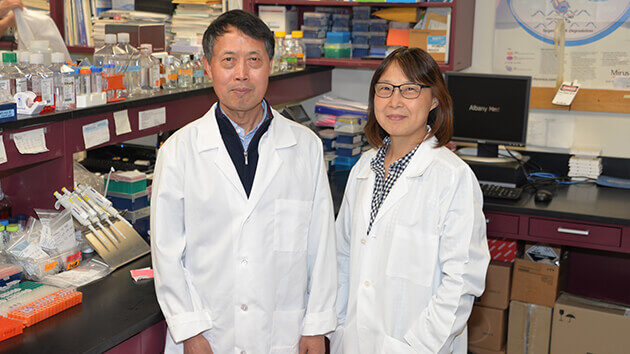NIH Awards Albany Medical College $1.2M to Study Heart Failure

Researchers will seek to identify innovative new ways to treat the disease
Scientists at Albany Medical College have received a $1.2 million grant from the National Institutes of Health (NIH) to study heart failure, as part of a joint award with Thomas Jefferson University totaling more than $2.3 million over four years.
According to the CDC, approximately 6.2 million adults in the U.S. have heart failure, a chronic condition that occurs when the heart can’t pump blood as well as it should. One in 500 people have hypertrophic cardiomyopathy, a genetic disorder that causes the heart muscle to thicken and which can lead to heart failure. In both diseases, the rest of the body doesn’t get enough blood to function properly, which can cause symptoms like fatigue and shortness of breath.
The research teams will focus on how the protein ryanodine receptor type 1 (RyR1) regulates cardiac function.
Using mouse models with both healthy and failing hearts, they’ll test the hypothesis that RyR1 is initially expressed as an adaptive mechanism when the heart doesn’t have enough energy to pump as well as it should. But when too much RyR1 is expressed, a vicious cycle ensues leading to muscle cell death and injury, and, ultimately, heart failure.
“We’ll also examine a potentially innovative therapeutic strategy that targets RyR1,” said Yun-Min Zheng, MD, associate professor in the Department of Molecular and Cellular Physiology at Albany Medical College, one of the study’s principal investigators.
“Drugs like dantrolene inhibit RyR1 and have already been used to treat people who have a severe reaction to certain anesthesia drugs,” she explained. “We hope to show that these drugs could also be an effective treatment for heart failure and hypertrophic cardiomyopathy.”
Yong-Xiao Wang, MD, PhD, professor in the Department of Molecular and Cellular Physiology at Albany Medical College, and Shey-Shing Sheu, PhD, professor of Medicine, Division of Cardiology at Thomas Jefferson University, are also principal investigators.
Titled “Crosstalk Ca2+ Signaling between Ryanodine Receptors Type 1 and 2 in the Pathogenesis of Cardiac Hypertrophy and Heart Failure,” the study is funded by the NIH’s National Heart, Lung, and Blood Institute.